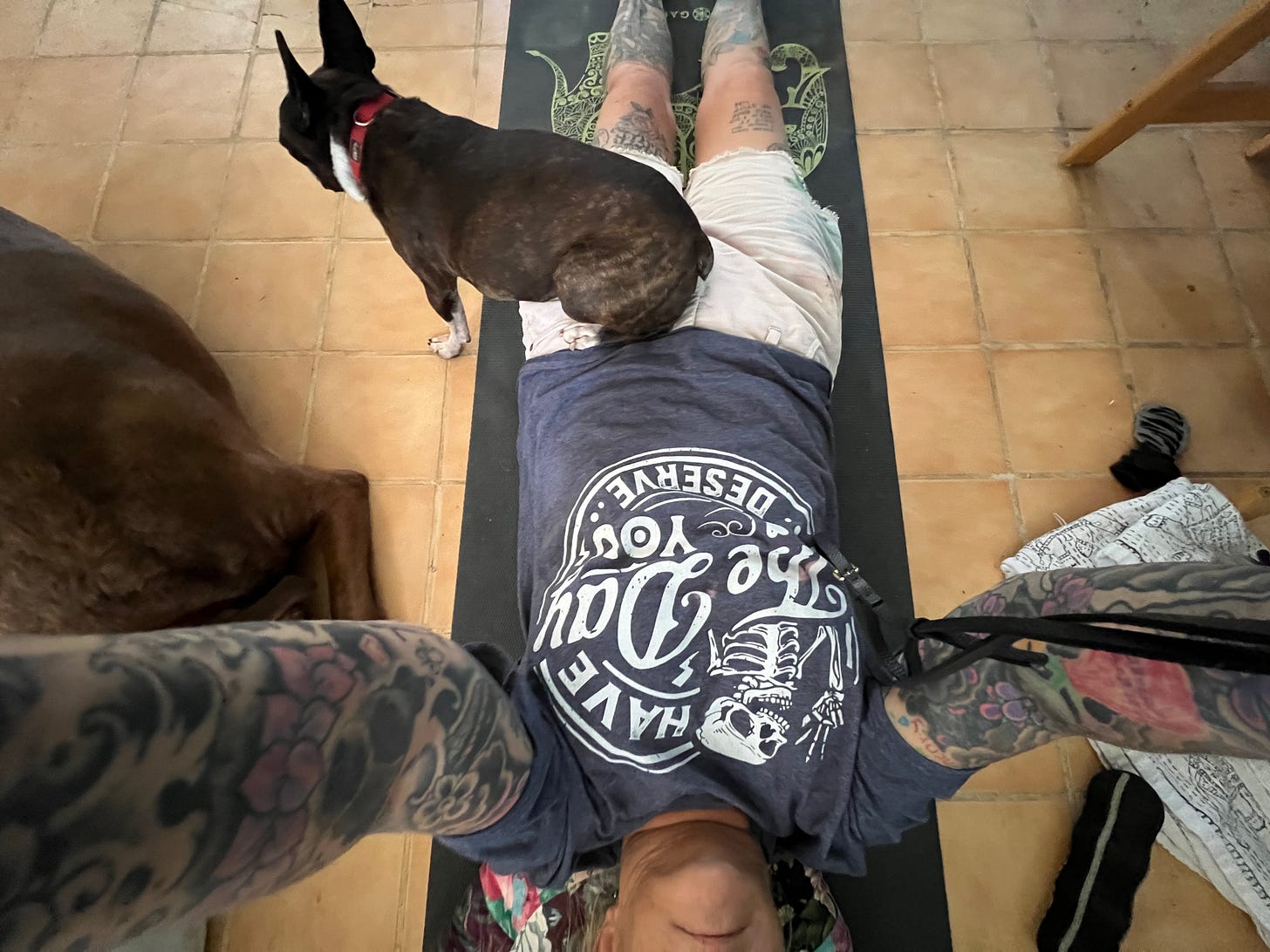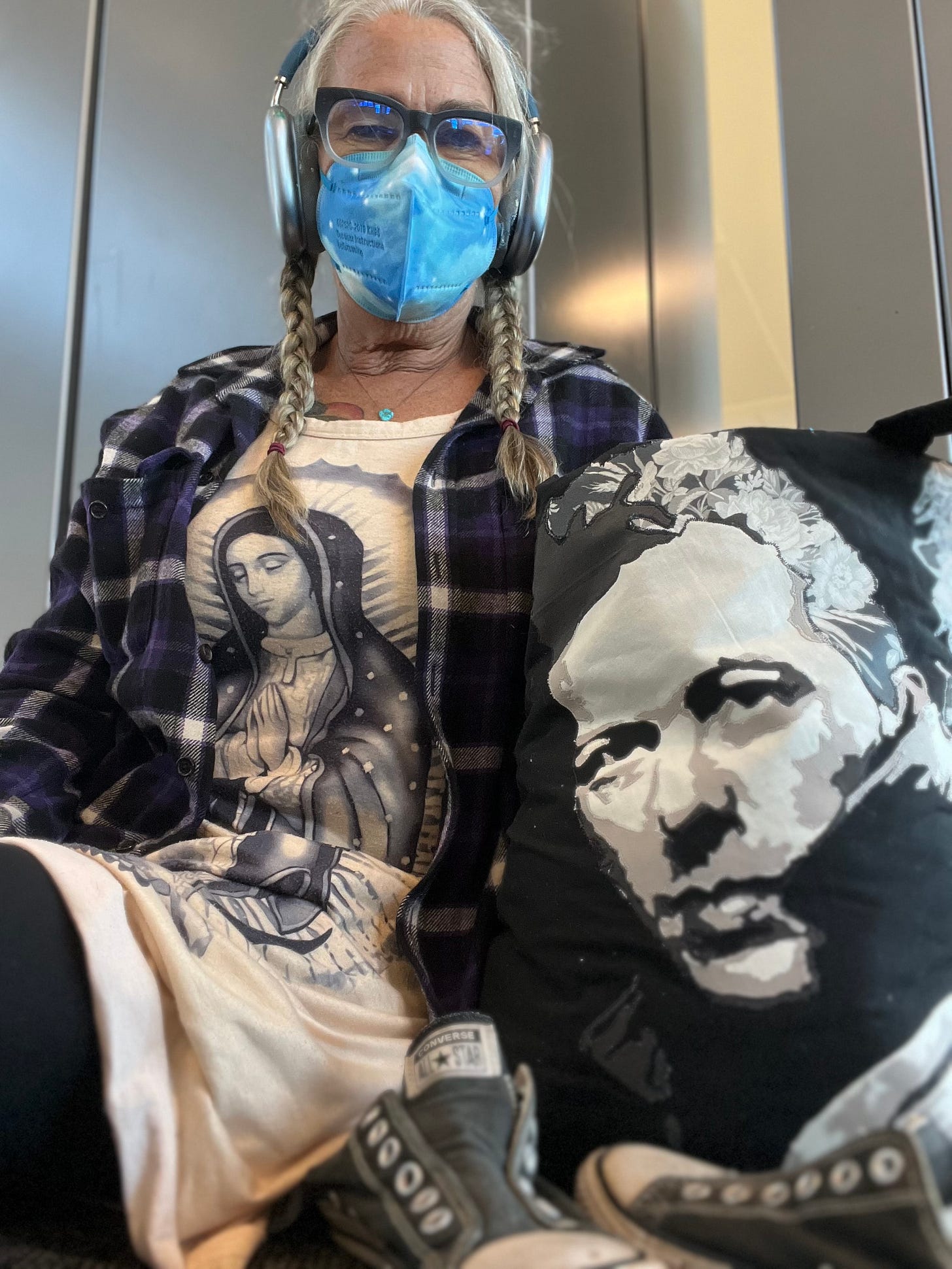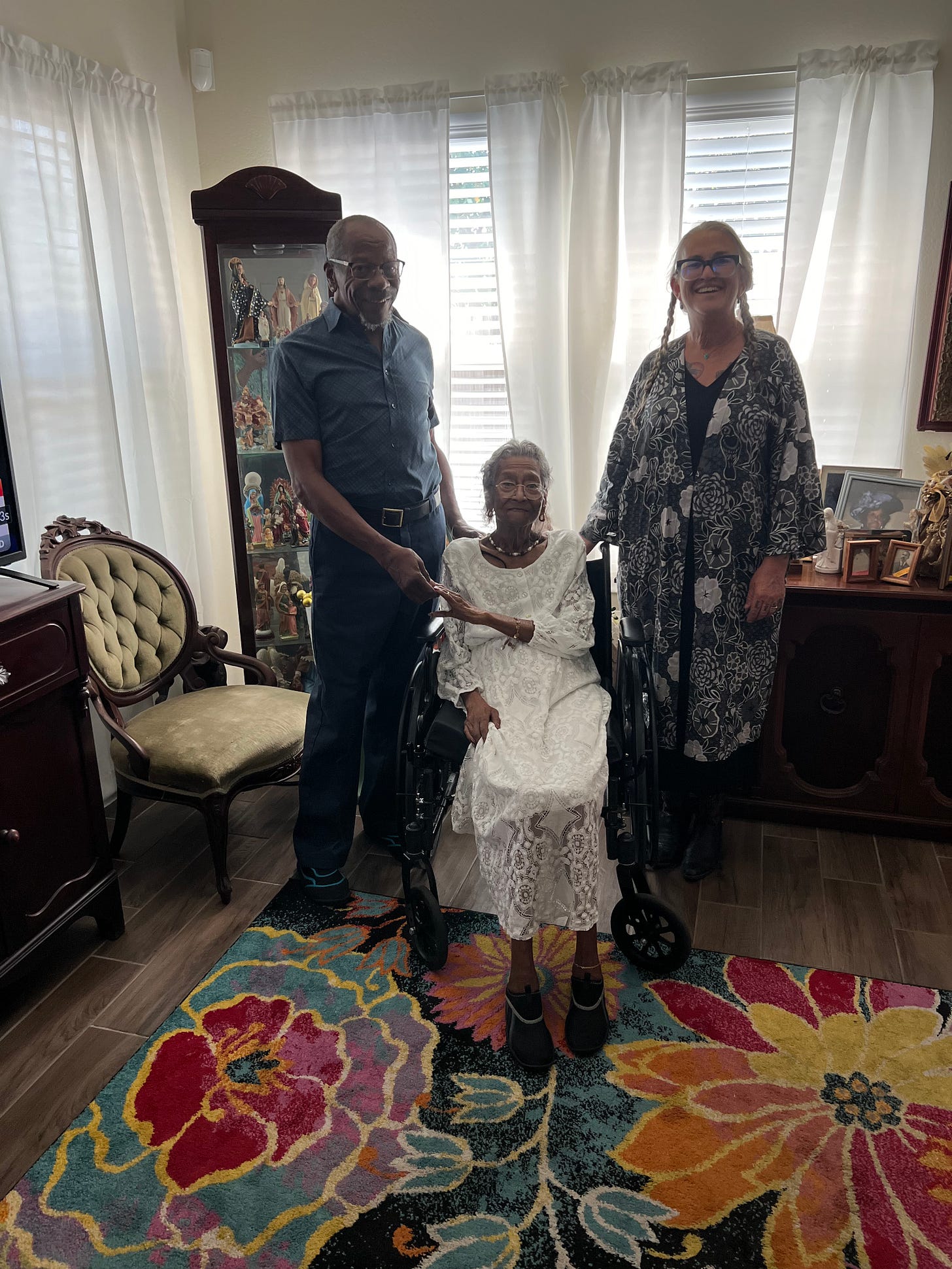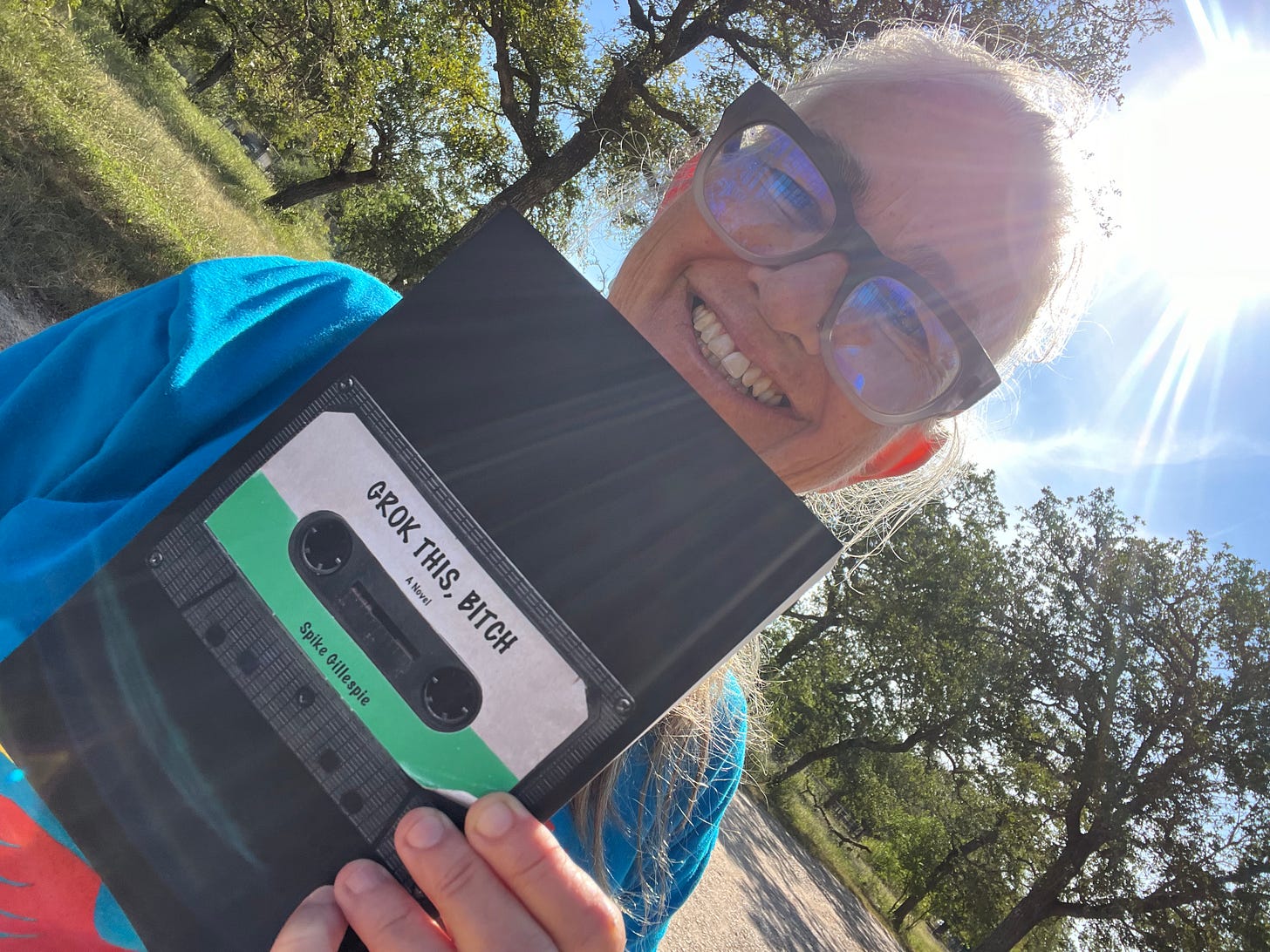Wide Open Spaces
“Liminal space!” Emily offers cheerfully.
I had been trying to explain to her my experience of the day before, waiting eight hours to board a JetBlue flight that ultimately never did leave the airport. I was having a hard time capturing the trippy effects of all the overstimulation, the bizarre dream state I seemed to be in as I alternately walked laps around the terminal, overate overpriced unhealthy (but delicious) food, and tried to find quiet unoccupied spaces to scrunch down into where I might escape the hubbub. (Impossible.)
When Emily said “liminal” my brain initially flashed an image of the word “limn,” which in turn demonstrated yet again how chock full of useless trivia my mind is. Because as soon as I thought of the word “limn,” I immediately thought of Michiko Kakutani, former foreboding book critic for the New York Times. I thought of her because once, a gazillion years ago, I’d read a criticism of the critic, accusing her of overusing the word limn in her writing, and for some reason I held onto that.
But no, other than one word containing all of the letters of the other word, there was no connection.
As it turns out, a liminal space is “the uncertain transition between where you've been and where you're going physically, emotionally, or metaphorically. To be in a liminal space means to be on the precipice of something new but not quite there yet. The word ‘liminal’ comes from the Latin word ‘limen,’ which means threshold.” This can be a mental space—such as during meditation. It can be a physical occurrence, such as being sick. It can be an emotional state, like divorce. Or it can be a physical location like a bridge or an airport.
This in-between state, regardless of form, can be confusing and anxiety-inducing, seeing as even if you think you know where you’re going, you’re not there yet, and so your mind—or at least my mind—can have a field day dwelling in uncertainty, typically an uncomfortable experience unless you happen to have a blackbelt in measured curiosity, which I do not.
The last time I flew was in early March 2020, right before the world locked down. Prior to that, I flew often, sometimes up to ten times per year. I can’t say I love flying, but I was used to it, accepting as best as I could that flight-related aggravation eventually yields to the triumph of reaching one’s destination most of the time.
Understanding that I was very rusty at this whole travel thing, and honoring that I was still dealing with some fallout of having been wildly triggered a few weeks ago, I took helpful measures. I remembered to bring my heavy duty headphones to dull the perpetual aural attack that comes with being surrounded by thousands of people creating a collective wave of noise. I reminded myself it was okay to ask for help if I got confused, which I did—got confused, asked for help. Noting how few people were wearing masks, I told myself to mind my business, not to waste time getting angry at their stupidity. Realizing that in the interim between my last airport trip and this one that the whole place had gone cashless (rendering the wad of small bills I’d brought along useless), I didn’t waste time cursing this thing I could not change. I whipped up some gratitude that I had a couple of credit cards with me.
I thought about so many airport meltdowns I’d had in my youth, driven to rage by long delayed flights, misinformation doled out by mean gate agents, rude fellow travelers. I told myself this wasn’t going to happen now, that I had plenty of tools to cope. I encouraged myself to enjoy the pageantry before me, so much excellent people-watching to be had.
And, as with the Angry Dog Hater Man I’d encountered the week prior at Barton Springs, I challenged myself to look for other versions of me in passersby, to recognize our commonalities instead of our differences. Toward this end, I was treated to a few moments of absolute pure poetry in the form of two moms and two toddlers, who wandered by me one after the other.
The first toddler was screaming so loudly that it truly was impossible not to look. I’m talking blood-curdling and sustained. And, as it turns out, flung over his mother’s shoulder as she marched him through the terminal, stone faced and feigning deafness as the little guy arched his back and kicked and screamed even louder. Oh yes, I totally understood that child, easily recognizing a version of him that dwells inside of me, whom I have gotten better at soothing over the years, but who sometimes still surfaces, as is the case when I am triggered.
Then came the second toddler, Wee Chonk Man, his pudginess enhanced by the fluffy diaper barely contained by his little pants. This guy, clearly new to the whole walking thing, clutched his mother’s hand and placidly plodded along, stumbling like a late night drunk trying to pass a field sobriety test. I watched the crowd shift gears from the tension wrought by the screaming kid to the joy of taking in this far more complacent child. There’s a version of that kid in me, too, though admittedly it is rare for me to simply follow along blindly trusting as he clearly was.
Cherry on top of this mini-parade—devil child, angel child—was that despite having my monster headphones firmly in place, I could still hear a muffled version of the music playing over the PA system. Lucinda Williams, singing on repeat, “Are you alright?”
Was I alright? I checked in with myself as it became increasingly clear that my clever plan to zip up to New York for 36 hours to spend a single full day with my son—whom I’ve not seen in years—was going to be foiled. Actually, to my surprise, I did indeed feel pretty alright. Disappointed, but with perspective.
I have always hated that my mother, anytime any of us kids was upset, admonished us to “think of the worse off,” as if our own feelings were then and would always be insignificant. (Once, many years ago, when I confided in her I was having severe suicidal ideation, she did not console me, just offered the same tired old advice.) Still, echoes of this sentiment often assault me as I am descending into a dark place. Was it really the end of the world that I, privileged white travel lady, wasn’t going to get to go where I wanted to go? Nah. I had to admit a lot more people were having a lot more bigger problems than this.
I shifted momentarily back to another liminal space I’d been in two days before. I’d been lying on my yoga mat, trying to sink into a guided meditation about releasing the anxiety that was riddling me, failing miserably thanks in part to the dogs’ “assistance.” The phone rang. Rather than ignore it, as I often do, I answered. As the voice on the other end spoke, I felt confused and realized my mind was still halfway in the guided meditation trance. It took me a moment to get my bearings and understand what I was being asked. The guy’s partner was dying, Stage IV cancer, and they needed to get married in a hurry. Was I available the following day?
The request snapped me out of Liminal Land and into action. Being asked to help, getting an opportunity to step outside of my own mental turmoil, often has a way of providing a reset. I love being useful. I love being of service. I love getting to be part of other people’s families, even if only for an hour at a time, which my work as a wedding and funeral officiant gifts me. That tiny wedding, bride in a wheelchair in her living room surrounded by photos of long gone family members who nonetheless bore witness, so lifted my spirits and, yes, gave me something to chew on when, after seven hours in the airport, my patience finally did begin to wear thin. Things definitely could be worse.
A couple of days after the trip that wasn’t, I read an interesting article about how some airports are working to better accommodate neurodivergent travelers. I didn’t learn about my ADHD until lockdown (which, as an aside—seems to me that lockdown itself was one massive Liminal Space). The diagnosis has allowed me to better understand how my brain works and, consequently, to learn and practice strategies to more calmly navigate the overstimulating world. The article reinforced my learned experience—it’s not my imagination, airports are really tricky places even for the neurotypical, surely in large part due to their liminal nature.
Turns out, some airlines even offer programs where those of us with challenges like ADHD and autism can do a dress rehearsal, show up, get on a real airplane, and pretend to go on a trip. Then, when they (we) actually travel, there are fewer unknowns and thus less opportunities for meltdowns. Thanks to JetBlue and the Flight That Never Was, I won’t need to attend one of these formal sessions. I left the airport reminding myself the long day spent going nowhere had not been wasted, not at all. In that liminal space I took so many mental notes and mostly stayed calm. Next time, I’m going to do even better.
NOTES:
Y’all! My Kickstarter Campaign ends next week. PLEASE, if you haven’t already, pre-order a copy of my new novel, GrokThis, Bitch, CLICK THIS LINK. I just need 23 orders today to hit 100 pledges. That would mean so much to me. Plus it’s a great book, I promise you. Also my last book, I swear.
This substack does not have a paywall. Thank you EVERYONE for reading. Special thanks to paid subscribers—your support helps keep this boat floating. If you’re not yet a paid subscriber and can swing $5 per month, please consider doing that. If you’re not able to do that, you can still help by sharing this with folks you think will dig it.
My FREE in-person writing workshops at the Hampton Branch Library in South Austin resume Tuesday September 3, 2024 at 5:30 pm. It’s a great group. We meet for two hours. Spaces are limited so please REGISTER HERE.
Speaking of writing—I have another substack for writers where I offer writing prompts and insider information re: the writing life. All levels welcome from beginners to professionals. WriteWithSpike.substack.com.





